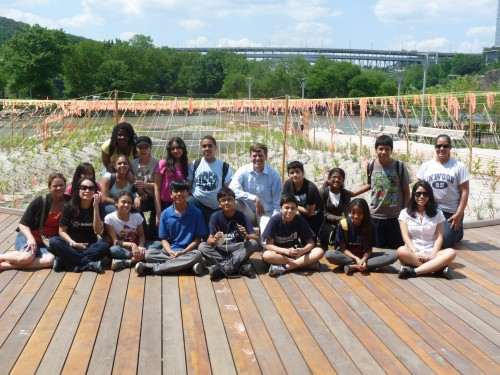On Thursday, June 20, 2013, 6th grade students from I.S. 52 in Inwood participated in a service learning project at the new Muscota Marsh on West 218th Street and Indian Road. The students were involved in an interactive lesson on the history of the marshes in the Inwood neighborhood, the structure of tidal and non-tidal marshes, and the benefits of having these marshes in the community.
The project was lead by Matthew I. Palmer, Ph.D., Senior Lecturer and Director of Undergraduate Studies at Columbia University's Department of Ecology, Evolution and Environmental Biology. "This marsh can function as an outdoor laboratory for lessons in biology, earth science, chemistry, and many other subjects," said Palmer. "It will provide environmental benefits to the community including cooling, storm water management, and habitat for wildlife. It is a recreational and scenic benefit-another green space for the community to enjoy."
The Muscota Marsh will create new public access and new amenities on the waterfront, restore and extend the area's native marshland adjacent to Inwood Hill Park, and create an opportunity for increased educational and recreational activities for the community.
"This project was fun and educational. We were able to learn what an actual marsh is and its importance to the ecology in our neighborhood," said 12-year-old David Linares. "My favorite part of this project was checking the temperature of the soil. I did not know that was possible and important to know."
"I visit Inwood Park regularly but did not know the marsh was there-or what a marsh was. Now, I am excited to have access to it soon," said 12-year-old Fernanda Brito.
"It is extremely important for kids in this neighborhood to have these opportunities to apply class concepts within their own communities. This project opened students' minds to embrace their inner-city neighborhood as a living environment and ecosystem-not just buildings and roads," Said Adaliz Gonzalez, Assistant Principal of I.S. 52. "This project provided a meaningful experience for these students who were eager to participate, learn and apply critical thinking."

